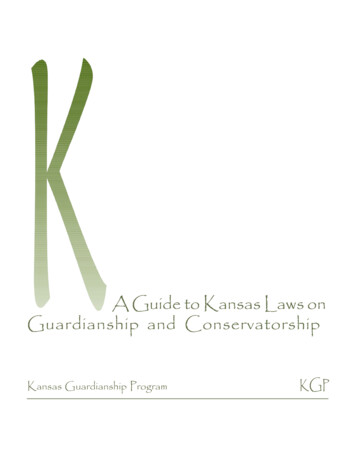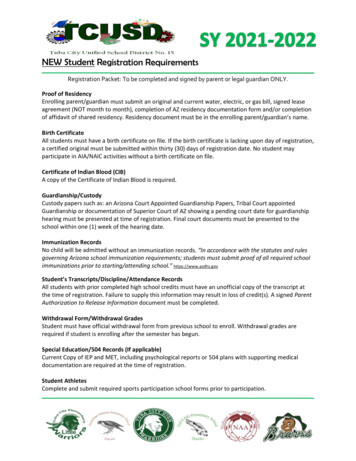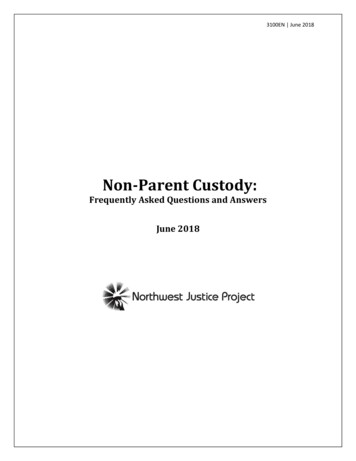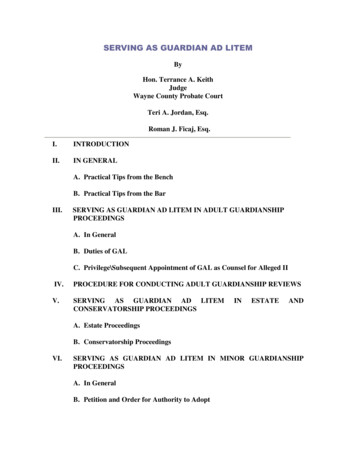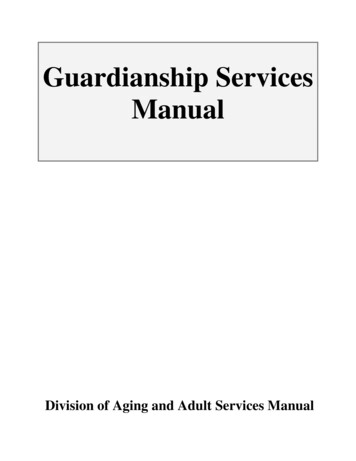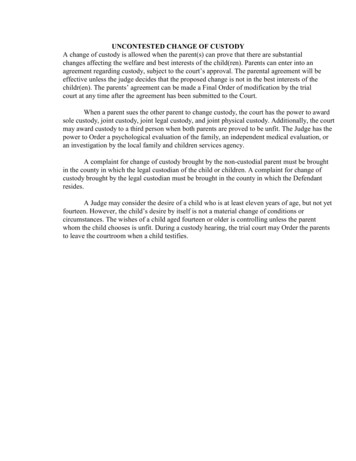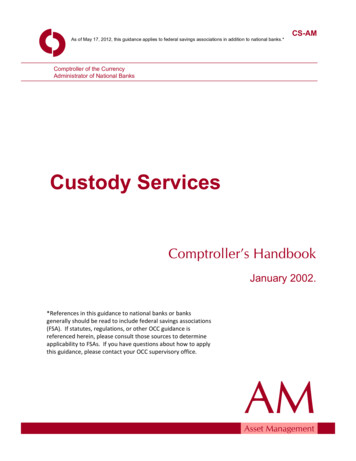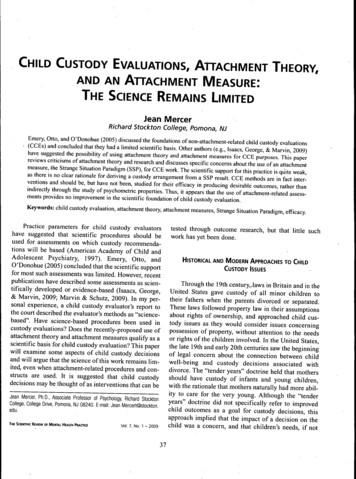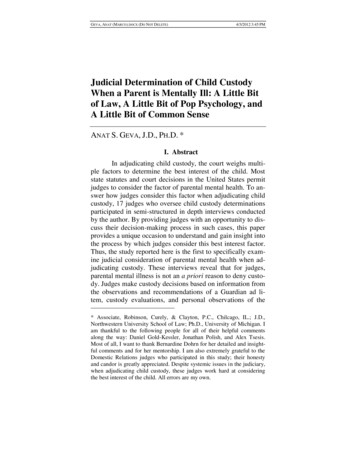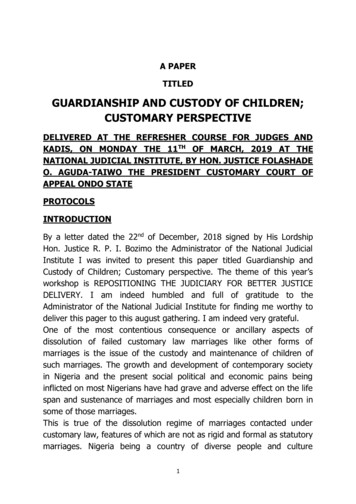
Transcription
A PAPERTITLEDGUARDIANSHIP AND CUSTODY OF CHILDREN;CUSTOMARY PERSPECTIVEDELIVERED AT THE REFRESHER COURSE FOR JUDGES ANDKADIS, ON MONDAY THE 11TH OF MARCH, 2019 AT THENATIONAL JUDICIAL INSTITUTE, BY HON. JUSTICE FOLASHADEO. AGUDA-TAIWO THE PRESIDENT CUSTOMARY COURT OFAPPEAL ONDO STATEPROTOCOLSINTRODUCTIONBy a letter dated the 22nd of December, 2018 signed by His LordshipHon. Justice R. P. I. Bozimo the Administrator of the National JudicialInstitute I was invited to present this paper titled Guardianship andCustody of Children; Customary perspective. The theme of this year’sworkshop is REPOSITIONING THE JUDICIARY FOR BETTER JUSTICEDELIVERY. I am indeed humbled and full of gratitude to theAdministrator of the National Judicial Institute for finding me worthy todeliver this pager to this august gathering. I am indeed very grateful.One of the most contentious consequence or ancillary aspects ofdissolution of failed customary law marriages like other forms ofmarriages is the issue of the custody and maintenance of children ofsuch marriages. The growth and development of contemporary societyin Nigeria and the present social political and economic pains beinginflicted on most Nigerians have had grave and adverse effect on the lifespan and sustenance of marriages and most especially children born insome of those marriages.This is true of the dissolution regime of marriages contacted undercustomary law, features of which are not as rigid and formal as statutorymarriages. Nigeria being a country of diverse people and culture1
presents a deluge of customs, usages and traditions governing marriagedivorce and custody relative to each community. The diverse customarylaws of marriage prescribe basic obligatory rules governing the creationof a valid marriage, the dissolution and custody of children. The fulcrumof this paper is the examination of various laws relating to guardianshipand custody of children born under failed customary law marriages. Theessay will review both case laws and statutory provisions that supportlegal principles with regard to the grant of custody of a child by thecustomary courts. Emphasis will be placed on relevant provisions of lawsrelating to guardianship and custody of children under customary law inOndo State.An attempt would be made at the interpretation and explanation of keywords in this paper namely; “Customary Law”, “guardianship”, “custody”and “child”.1.1 DEFINITION OF TERMSa) CUSTOMARY LAWThere have been a lot of definitions of the tern Customary Law by a hostof legal writers, scholars and Jurists. Customary law can be defined as“the body of unwritten norms, rules and regulations which a givencommunity accepts and recognises as binding and having the force oflaw, which governs and regulates the relationship and transactionbetween members of that community”. The above definition will implythat for a particular rule of customary law to acquire the status of law itmust be recognised and adhered to by the members of the communityas binding and enforceable by the courts. The Supreme Court in thecase of ZAIDEN Vs MOHSSEN (1973) ALL NLR Page 740 definedCustomary Law as; Any system of law, not being the common law andnot being a law enacted by any competent legislature in Nigeria butwhich is enforceable and binding within Nigeria as between the partiessubject to its sway”.b) THE TERMS “GUARDIAN” AND “GUARDIANSHIP”The word ‘guardian’ is defined in Black’s Law dictionary as one that haslegal authority and duty to take care for another’s person especiallybecause of the other’s infancy, incapacity or disability. A guardian is aformally placed in loco parentis to a child usually by appointment hasthe same rights and duties as a parent.2
A guardian may be appointed either for all purposes of for specificpurposes. For the purpose of this paper a guardian will be oneappointed to take care and control of a minor child’s wellbeing undercustomary law.The word guardianship is usually used interchangeably with custody ofchildren under customary law. Under the general law a person is madethe guardian of a child who has no natural parents or has parents whoare incapacitated or unable to provide for the welfare of the child. Thisis the most flexible and quickest legal arrangement for taking care andcustody of such children. Parents are the natural and legal guardians oftheir children. It is only when if one or both parents are dead that that anon-parent such as a family member or an unrelated party could beappointed a sole or co-guardian. Once appointed a guardian such aperson is vested with the capacity to exercise parental responsibilitiesover such child. Such a guardian will have all parental and incidentalresponsibilities over the child to the full extent permissible by law. Suchguardianship order unless otherwise revoked will subsist until the childattains the age of majority.The issues of guardianship and custody of children respectively areclosely related since they are all concerned with the up-bringing andwelfare of children and the maintenance of their affairs. Parents are thenatural legal guardians of children. When a parent or parents aremanifestly unsuitable as guardians, the court has the power to appointother persons as guardians.What is the difference between custody and guardianship?Custody describes a parent’s care of a child, whereas legal guardianshipis granted to someone who is not the child’s biological parents. Manypeople conflate custody with guardianship when the two terms describedifferent things. The key difference is the child’s parentage; custodydescribes a parent’s care of a child, whereas legal guardianship isgranted to someone who is not the child’s biological parents. The mainrole of a guardian is to act in the best interest when the child’s parentcannot do so. Legal guardians are usually relatives such as aunt, uncleor grandparent. This may be due to death of the parents, incapacitation3
or incarceration for a crime. Custody is different from guardianshipbecause a guardian can make physical and legal decisions for the child.c) DEFINITION OF THE TERM ‘CUSTODY’‘Custody’ in general is defined as, “the care and control of a thing orperson for inspection preservation or security; more specifically. Black’sLaw dictionary 9th Edition defines “legal custody as “the authority tomake significant decisions on a child’s behalf including decisions abouteducation, religious training and health care”. Custody is where the care,control and maintenance of a child is awarded by a court to a relativeusually one of the parents in a divorce or separation proceeding or to aresponsible adult. It could be legal custody (decision making authority)or physical custody (care giving authority). Sometimes the court grantsjoint custody to parents which is an arrangement by which both parentsshare the responsibility for and authority over the child at all times. It isalso called ‘shared custody’. Justice Nnaemaka Agu J.C.A in the case ofWILLIAMS Vs WILLIAMS (1981) 1 Q.L.R.N. at page 122 at part127 submitted as follows:“I take the view that custody of a child essentially concernsnot only control of the child but also carries with it thenecessary implication of preservation and care of the child’sperson, physically, mentally and morally”.D) THE TERM “CHILD”The word “child” is a descriptive terminology for a natural person who isan offspring of another (either by birth or adoption) and may onlyrepresent any human being from the moment of birth (in a life state)until the attainment of the age of majority. A child from the instance ofbirth becomes a legally recognized person owning some legal rights andentitled to make claims. Since they are physically and mentally immaturethey cannot be treated as capable of taking absolute responsibility overtheir own lives. The word “child” is not defined under the CustomaryLaw Cap 41 Law of Ondo State Cap 41 2006. However under the Section2 of the Children and Young Persons Cap 28 Laws of Ondo State theword ‘child’ is defined as a person under the age of 14 years and “young4
person” means a person who has attained the age of 14 years and isunder the age of 17 years.Section 2 of the Infants Law Cap 66 (which is not applicable to childrenunder customary law) ‘child’ is defined as a person under the age of 18years. Statutory provisions on guardianship of children are also providedfor under the Infants Law Chapter 66 Laws of Ondo State. In the case ofFEBISOLA OKWUEZE Vs PAUL OKWUEZE (1989) 3 NWLR Part109 page 321 Uwais JSC reviewed all the relevant provisions of thelaw in the definition of the word child and came to a conclusion thatcustody order will not be made in respect of child who has reached theage of 16. The corollary to this rule is that custody order made inrespect of a child under the age of 16 will lapse or cease to be operativewhen that child attains the age of 16.However, generally orders of custody are not usually made by the courtin respect of offspring of a union who are above the age of 18 years.RELEVANT CONSTITUTIONAL PROVISIONThe care, custody and welfare of children (under the age of 18) inNigeria are strict functions of an intricate regulatory frameworkcomprising institutions and laws; beginning naturally with theConstitution of Nigeria.Section 17(3) (f) of the 1999 Nigeria Constitution imposes a nonactionable obligation on the Nigeria Government to ensure that childrenare adequately protected from exploitation, moral and material neglect.CUSTODY OF CHILDREN UNDER CUSTOMARY LAW IN NIGERIAOne of the most contentious consequential or ancillary aspects ofdissolution of customary law marriages like other forms of marriages isthe issue of custody of children. Under Customary Court’s Law of variousStates where customary courts are established, provisions made relatingto custody of children in the event of dissolution of customary lawmarriages by customary courts. For example, Section 16 of theCustomary Court Laws Cap 41 Laws of Ondo State 2006 provides that;A customary court shall have jurisdiction over all persons in Ondo State.5
The second Schedule sets out the Jurisdiction of Grade B customaryCourt Section 17(2) as follows;(1) Unlimited jurisdiction in matrimonial causes and mattersbetween persons married under customary law or arising fromor connected with a union contracted under customary law (butexcluding any such cause or matter relating to, or arising fromor connected with a Christian Marriage as defined under theCriminal Code)(2) Unlimited jurisdiction in causes and matters relating to thecustody of children under customary law.Where there no valid customary law marriage the customary court willnot have jurisdiction to dissolve an association of man and woman andalso make an order relating to guardianship and custody or custody ofchildren under such association. For a marriage to be subject toCustomary law, the ceremonies for consecrating the marriage under thatparticular system of customary law must have been complied with andthe bride price must have been paid. If the conditions for a validcustomary law marriage have not been met the customary court will nothave jurisdiction to entertain and determine the issue of custody of thechildren born under an association or a relationship when there is abreakdown of the association.WHAT IS THE BEST INTEREST AND WELFARE OF A CHILD?There exist a plethora of judicial decisions upholding the principle ofbest interest and welfare of a child in the award of custody. In the caseof BUWANHOT Vs BUWANHOT (2011) FWLR Part 566 page 552at 563 paragraph A the Court of Appeal held that the welfare of achild of a marriage, in terms of their peace of mind, happiness,education and co-existence is the prime the prime consideration ingranting custody. Similarly in the Court of Appeal’s decision inODUSOTE Vs ODUSOTE (2012) 3 NWLR Part 1288 page 478 at487 ratio 15 the court stated that interest of the child would includethe welfare, education, security and overall well being and development.Even though the cases cited above are in relation to the issue of custodyin relation to custody of children under statutory marriages the principlesthere are applicable to customary marriages particularly in the6
interpretation of similar provisions contained in the customary courtrules of States where they have been created. It is necessary to nowexamine such provisions.Section 22 (1) of the Customary Courts Law Cap 41, 2006 provides that;“In any matter relating to the guardianship or custody ofchildren, the interest and welfare of the child shall be ofparamount consideration”.Similar provisions are also contained in Section 28 of the Customary Lawof Lagos State 2011 and Section 16 (1) of the Customary Court Law ofEnugu State.Similarly under Section 71 of the Matrimonial Causes Act Laws ofFederation of Nigeria provides that “In proceedings with respect to thecustody, guardianship, welfare and advancement or education of thechildren of a marriage (which applies to children born under statutorymarriage) the court shall regard the interest of those children as theparamount consideration.The interest and welfare of the child therefore takes precedence overany law or custom that might confer custody of the child on anybody. E.I. Nwogugu, in his book on Family Law in Nigeria 1974 dealing withcustody of Children under Customary Law put the position succinctlythus: “Under most Customary law systems in Nigeria, the belief is thatthe father has absolute right to the custody of his legitimate orlegitimated child. Upon his death the male head of the father’s family isvested with the right although the day to day care of the children maybe the responsibility of the mother. However, customary law alsorecognizes that the father’s absolute right will not be enforced where itis not solely in favour of the interest and welfare of the Child. Forinstance, where the child is of tender age, customary law requires that itshould be left under the care of the mother. In such a case the father’sright is merely in abeyance, and may be exercised when the child couldsafely be separated from the mother”.Margaret C. Onokah, in her book Family Law 2002, wrote, that;”Under customary law, a father has exclusive custodial rightover the children of his marriage; the right extends beyondcustody, to ‘ownership’ of the children. Thus his right hasbeen described as capable of transmission to his family7
members. The general principle of Customary Law is that themother’s lineage has no right to the child. The tendency is forthe father to have exclusive custodial right of a father overthe children of customary marriage. This rule of customarylaw hinged on the fact that most Nigerian communities arepatrilineal by reason of which children belong to their father’slineage”This exclusive custodial right of a father over the children is notapplicable under statutory marriage. Where however the children arestill of tender age in need of motherly care and affection, the childrenare kept in the custody of their mother until they can be properly andsafely separated from their mother and returned to their father.Under Yoruba Customary Law, mothers are granted custody of femalechildren that are yet to be weaned. In Igbo Customary Law custody ofweaned children are usually given to the father. Even where a child hasbeen weaned and is under the age of five the court is likely to lean morein favour of granting custody of the child to the mother. One mustappreciate the fact that Nigeria has numerous ethnic groups andcustomary laws which varies very broadly.A good example of the patriarchal tendency on the part of the court inthe exercise of its discretion is the case of OYELOWO Vs OYELOWO(1987) 2 NWLR Part 56 page 239 where the court granted thecustody of two male children to their father in spite of the fact that thechildren lived with their mother for two years since the separation oftheir parents. Counsel urged the court to set aside the judgment of thelower court and grant custody of the two children to the appellant.If the court as a general rule holds that male children should be withtheir fathers this may not be in the best interest of the child. Where thefather re-marries, there is no assurance that the child will have the samelove and attention from the step mother. Adhering to the rule ofgranting custody of a child to the father means that there is no equalitybetween the parents as to the custody of the child.In the matter of custody of the child equality of right of parents shouldbe the basic premise upon which the court should consider custodycases when among other factors the court is considering the interest of8
the child. A court is not entitled to prejudge which party will havecustody before considering the interest of the child.Nigerian courts have consistently applied the principle of theparamouncy of child’s interest and welfare in custody cases undercustomary law. For instance in OLAYEMI KASEBIYE Vs ADEYEMIAppeal No JD/22D/60 (unreported) Jos High CourtSeptember1, 1964, the trial customary court awarded the custody ofa child to the father. This decision was sustained by the immediateappellate court. On further appeal, the Jos High Court acknowledgedthat the decision below was in accordance with the applicable law, butawarded the custody of the child to the mother to conform with the bestinterest of the child.Most judicial decisions by courts have generally upheld this principle oflaw. It must be said however that the strict application of this custom isfast waning. The customary law which make the father of a child tohave a right to the custody of a child has been modified and watereddown in the Supreme Court’s decision in the case of FEBISOLAOKWUEZE Vs PAUL OKWUEZE (SUPRA) Page 329. The court whendealing with the right to custody of children of a dissolved marriageconducted under customary enunciated that under most systems ofcustomary law in Nigeria, the father of a legitimate or legitimated childhas absolute right of custody of the child. Though they recognized thesuperior rights of the father; this right will not be enforced where it willbe detrimental to the welfare of the child. Fortunately, the SupremeCourt held in the case of WILLIAMS Vs WILLIAMS (SUPRA) thatwith regard to the custody or upbringing of a minor, a mother shall havethe same rights and authority as the law allows to a father and the rightand authority of mother and father shall be equal and exercised byeither without the other.Apart from judicial decisions there has also been statutory interventionin cases of judicial dissolution of marriage where emphasis at a time wason the superiority of paternal rights of a father to that of a mother in theaward of custody of a child in the case of judicial dissolution of marriageunder customary law.As early as 1958, there was the promulgation of the Marriage, Divorceand Custody of Children Adoptive By-Law applicable in Ogun, Oyo Ondo9
and Bendel (now Edo and Delta States) which make the interest andwelfare of a child to be of paramount importance in the consideration inthe making of a custodial order. The provision of the Law is nowcontained restated for example the Ondo State Customary Court Rules2006 Cap 41 Appendix III on Marriage, Divorce and Custody of ChildrenAdoptive Bye-Laws Order Section 14 thereof provides as follows;“When making an order with regard to paternal rights over achild the court;(1) Shall at the same time make an order with regard to thecustody and upbringing of such child and in makingsuch order the interest and welfare of the child shall befirst and paramount consideration”.Therefore rather than automatically granting custody of a child to thefather the court shall first consider the interest and welfare of the child.Although the best interest of the child is the first and paramountconsideration, it is not the only consideration. In the case of OBAJIMIVs OBAJIMI (2012) ALL FWLR Part 649 page 1168 the Court ofAppeal held inter alia that although the welfare of the minor is the firstand paramount consideration. It is not the sole consideration. Theconduct of the parties must also be taken into account. This issue shallbe dealt with later.In recent times many different factors are taken into consideration indetermining to issue of custody of children of a customary marriage. Thefactors which have been regarded as relevant by the courts include butnot limited to the following;1) The arrangements made by the parties for the education of thechildren,2) Proper care of the child,3) The degree of familiarity of the child with each parent or party,4) The income of each parent,5) The amount of affection by the child for each parent or party,6) The child’s familiarity with the environment where they havealways lived,7) The respective accommodation of the parties and8) The fact that one of the parties now lives as man and wife with athird party who may not welcome the presence of the child.10
9) The fact that custody of children of tender age will most probablybe awarded to the mother unless other considerations makes itundesirable,10) The fact that in principle children should not be separated butshould as much as possible live and grow together.These principles were highlighted in the cases of ALABI VS ALABI(2007) 9 NWLR Part 1039 page 309, AFONJA Vs AFONJA (2000)11 NWLR Part 677, CHARITY OKAFOR Vs PAUL OKAFOR (2016)LPELR - 40264 and ODUCHE Vs ODUCHE (2006) 5 NWLR Part1039 page 297 C. A.CONDUCT OF THE PARTIESThe conduct of the parties to the marriage is also taken intoconsideration in deciding whether to award custody of a child to oneparent or the other. In other words before making an order for custody,the trial court must also take into consideration the conduct of the fatherand the mother, their comportment and biodata. This point has beenregularly emphasized in decided cases. Thus in the case of AFONJA VsAFONJA (SUPRA) the Western State Court of Appeal observed that thewelfare of the infant although the first and paramount consideration isnot the sole consideration and the conduct of the ‘guilty’ party is amatter to be taken into account.In the case of OBAJIMI Vs OBAJIMI (SUPRA) at page 1173, theCourt of Appeal on page 1187 paragraphs A – C stated as follows;“Where in any proceedings before any court, the custody orupbringing of a minor is in question, the court in decidingthat question, must regard the welfare of the minor as thefirst and paramount consideration, and must not take intoconsideration whether, from any other point of view, theclaim of the father in respect of such custody or upbringingis superior to that of the mother, or the claim of the motheris superior to that of the father, the welfare of the minor,although the first and paramount consideration, is not thesole consideration, the conduct of the parties is a matter tobe taken into consideration”.11
In the case of IJEOMA OKAFOR Vs MADUKE OKAFOR (1971) HighCourt of East Central State Onitsha Judicial Division thepetitioner’s counsel had insisted on giving details of the matrimonial lifeof the parties to the court because he thought that by exposing thevarious acts of misconduct of the respondent during the marriage, hisclient’s case in asking for custody of the child of the marriage would beenhanced. Commenting on this Oputa J. (as he then was) stated that;“The award of custody of a child is based on considerationsother than guilt, blameworthiness or innocence of the partiesconcerned”. He also stated that “in all cases for the custody of achild, the paramount consideration in fact the conditionprecedent is the welfare of the child”.Custody is never award as a result for good conduct nor is it ever deniedas punishment for the guilty party who was responsible for thebreakdown of the marriage. The child was used to the respondent andhad been well looked after by him. On the other hand, he did notrecognise the petitioner any longer. For those and other reasons,custody was awarded to the respondent in spite of his guilt.If the parties have made equally laudable arrangements for theeducation, general well-being of the child, the misconduct of one partymight tilt the balance in favour of the other. However grave or persistentmisconduct, acts of moral depravity by one party may by themselves beevidence that the party concerned is not fit and proper to be entrustedwith the custody of a child.In LAFUN Vs LAFUN 1967 NMLR page 401 the Court not onlyrefused custody to a child’s mother but also refused her access to visithim in the following words;“Owing to the moral depravity of the respondent (mother) itwill not be the best interest of this child (born in 1960) forthe respondent to have frequent access to him in hisformative years when he could easily be influenced. When thechild attains the age of 14 years, the petitioner may allow therespondent access if he so wishes”.AWARD OF CUSTODY TO THIRD PARTIES OTHER THAN THEPARENTS OF A CHILD12
The law regulating Customary Courts procedure does not specify whichpersons are eligible for the award of the custody of a child. It thereforefollows that where the court finds that the parent or parties are unfit totake care of the child whether male or female, any third party (usually arelation) may be awarded custody of such a child.In OKWUEZE Vs OKWUEZE (SUPRA) Per Uwais JSC (as he then was)opined:“The court may refuse to grant custody to either parent,if the court is convinced that none of them is capable ofgiving the best care. In such a case, The Court maydecide to grant custody to a guardian.”Where the court considers it desirable to do so, it may place the childunder the custody of a third party (a person other than a party to themarriage), either permanently or as an interim measure, if it considersthis to be in child’s interest.The Court will make this order:1) Where it is obvious that either of the parties to the marriage is notgenuinely interested in the welfare and upbringing of the child.2) Where neither of the parties to the marriage has applied for thecustody.3) Where in the opinion of the court neither of the parties to themarriage is a fit and proper person to have custody of the child.If custody is granted to a third party, the court may include an order asto proper access to the child by the parents. So wide is the discretion ofthe court that it is empowered to grant custody of a child to a thirdparty either permanently or as an interim measure?This power was exercised by Taylor, C.J in HENRIETTA NWUBA VsCYPRIAN NWUBA (1971) LAGOS JUDICIAL DIVISION SUIT NO.WD/37/72 stated in the following words;“I am firmly convinced that the interim order which Imade on the 9th August for these three children toremain with their grandmother is in their very bestinterest and that order is to remain in force until thedetermination of the petition as is the order for accessand that of removing children out of the jurisdiction ofthis court. Custody is therefore granted to Mrs.Rosemary Inyama pending the determination of the13
petition.”i See Nigerian Family Law Principles, Cases,Statutes & Commentaries Prof Itse Sagay pages 553and 623.If custody is granted to a third party, the court may allow the parentsreasonable access to the child. It has been held that access is a basicright of the child rather than that of the parent. It is usually animportant factor in the child’s emotional development.CUSTODY OF CHILDREN BORN OUTSIDE CUSTOMARY LAWMARRIAGEWhere a child is born in an association not under a customary lawmarriage the Customary Court will not have jurisdiction to determine theissue of custody of such child. In some areas one will have to look atwhat customary law applies. In some instances the child remains underthe custody and care of the mother until the man pays dowry or carriesout other requirements that would entitle him to access or have custodyof the child. However, under strict customary law where an unmarrieddaughter has child, the proper guardian of the child will be the girl’sfather in his absence or on his death her mother. However where thereis no opposition from the family of the child’s mother, the natural fathermay acquire paternal rights over the child by acknowledgment wherethe custom is recognised. In some jurisdictions this customary court rulemay be displaced by the court giving consideration to the interest andwelfare of the child. The case of OWUMA Vs OGBODO (1976) 2 FNRPage 208 is instructive. Both the appellant (child’s natural father) andthe respondent (the mother) were lovers. A boy was born as a result oftheir relationship. The appellant removed the child from the respondent.The respondent’s father admitted at the trial that he receivedcompensation from the appellant according to Idoma Customary Law ashis daughter was not married to the appellant. The Area Court Grade 1Otukpo gave custody of the child to the appellant. This decision wasreversed by the Upper Area Court and a further appeal was made to theHigh Court where the court refused to deprive the appellant of thecustody of the child who had lived for years with the appellant who hadsent him to primary school from where he passed the entranceexamination to a secondary school.14
In the case of ANODE Vs MMEKA (2008) NWLR Part 1094 page 1 at 5ratio 3 Saulawa JCA stated as follows;“It is not in doby, as alluded to above that the custom asapplicable to Umuiyi Ndiukwu Akabo community, whichpermits a father to keep his daughter in the family home toprocreate out of wedlock, due to lack of male child, is morally,religiously and culturally obnoxious. Such a custom is repnantto natural justice, equity and good conscience, it is antitheticto the well cherished tenets of fundamental human rights asenshrined under Chapter IV of the 1999 Constitution. Thecustom in question no doubt promoted sexual promiscuity inthe society. And it is thus highly abominable.”Where children are born out of either customary or statutory marriagevarious
The key difference is the child's parentage; custody describes a parent's care of a child, whereas legal guardianship is granted to someone who is not the child's biological parents. . person, physically, mentally and morally". D) THE TERM "CHILD" The word "child" is a descriptive terminology for a natural person who is an .
